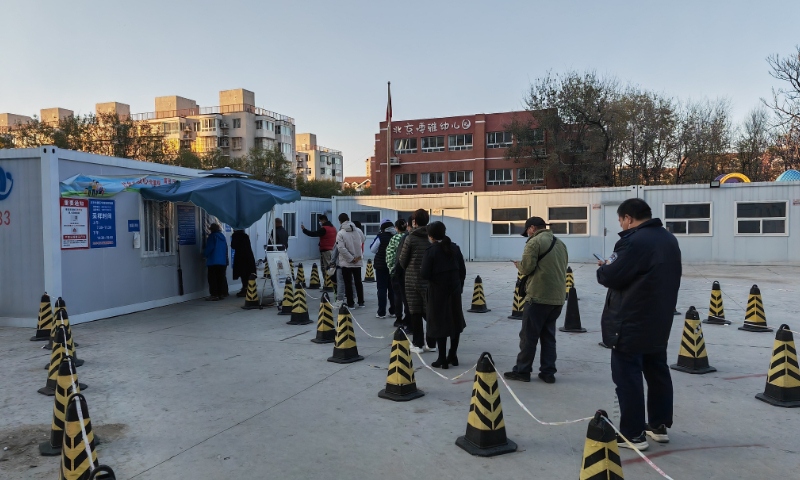
Residents in Beijing line to take nucleic acid tests on November 15, 2022. Photo: VCG
Beijing is facing the most complicated and severest anti-epidemic situation since the outbreak of COVID-19, said Beijing Center for Disease Prevention and Control (CDC) officials on Monday.
Beijing is at the most critical and toughest moment of fighting COVID-19, said Liu Xiaofeng, deputy director of the Beijing CDC, at a Monday press conference, urging citizens to protect the elderly at home and families with underlying diseases.
According to the national health commission, the capital reported more than 2,400 cases from Friday to 3 pm on Monday, with over 500 infections identified outside of quarantine zones through community-level test screening.
Liu said the Omicron BF.7 variant, imported from a trading town outside the capital, is the main strain in this round of outbreaks and has triggered cluster infections in nursing homes, construction sites and schools as the infections reported from Friday to Sunday were mainly concentrated in the districts of Chaoyang, Changping, Haidian, Fengtai and Tongzhou.
As daily infections continue to rise, the capital reported another two COVID-19 deaths, bringing the country's total death toll to three since May.
The National Health Commission confirmed on Monday that a female aged 91 and a male aged 88, both diagnosed with mild COVID-19 symptoms but with severe underlying diseases, died at Beijing Ditan Hospital on Sunday, following the death of an 87-year-old man who died on Saturday of sepsis triggered by a serious lung infection.
As of Tuesday, Beijing requires people entering the city to receive daily COVID-19 testing for three consecutive days, asking those arrivals to stay at home before their negative test results come out.
Some 146 of the 316 cases reported from 12 am to 3 pm on Monday were detected in the populous Chaoyang district, Beijing's major business and diplomatic hub.
Officials pointed out that Chaoyang district was the top priority area where anti-epidemic measures should be strictly implemented as there are still transmission risks hidden in the community level. Residents in Chaoyang were suggested to reduce cross-district movement and stay at home over the past weekend.
Liu also suggested people living in high-risk places to work from home and have online school classes, saying that public places should also limit the number of people to help reduce the movement of people.
Global Times



